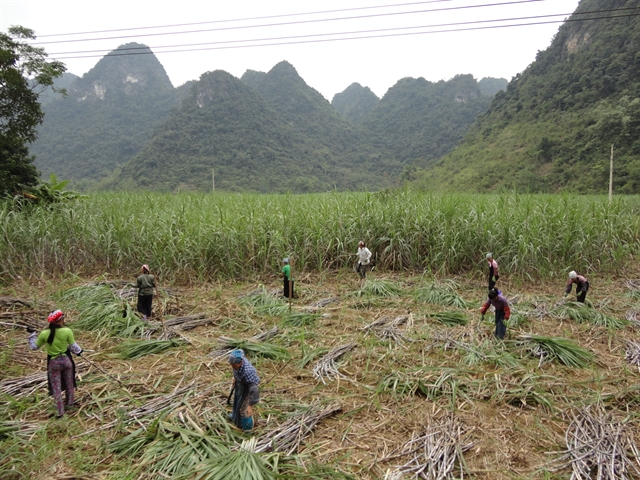 Economy
Economy

Provinces that grow sugarcane need to focus on improving added value and prices so that farmers are encouraged to keep growing it to develop Việt Nam’s sugar and sugarcane industry, a conference heard.

|
| Farmers harvest sugarcane in Cao Bằng Province. Many provinces have called for more incentives for farmers to keep growing the crop and not switch to others. — VNA/VNS Photo Chu Hiếu |
PHÚ YÊN — Provinces that grow sugarcane need to focus on improving added value and prices so that farmers are encouraged to keep growing it to develop Việt Nam’s sugar and sugarcane industry, a conference heard.
At a conference on the industry held by Người Lao Động newspaper and major sugarcane producer Phú Yên Province, Đào Lý Nhĩ, deputy director of the province Department of Industry and Trade, said the area under the crop had been shrinking, falling from nearly 28,000ha in 2017 to 21,601ha last year.
Besides climate change and the COVID-19 pandemic there were also local reasons such as the fact that the crop was mainly being grown in mountainous regions, making it hard to apply intensive farming and other effective models, underdeveloped irrigation systems and transport facilities, he said.
“When sugarcane farmers see that other crops are more profitable, they switch.”
Đinh Công Thuận, deputy head of the Khánh Hòa Province Agriculture Development Branch under the provincial Department of Agriculture and Rural Development, said with sugarcane prices falling, farmers were struggling to reinvest in the crop.
Unfavourable weather and low mechanisation rates kept productivity low, he said.
Hậu Giang Province has also seen the area under sugarcane shrink over the years and unstable prices.
It only has one sugar factory, and it does not process sugarcane by-products, and so the crop has low added value.
Solutions for the sugar industry
Nguyễn Quốc Toản, director of the Department of Agricultural Product Processing and Market Development, said businesses and farmers needed to link up, and research institutes should work with businesses to improve sugarcane quality and decrease production costs.
Businesses should invest more in processing technology and innovation, he said.
Nguyễn Văn Lộc, general secretary of the Việt Nam Sugar and Sugarcane Association, said a stable sugar market with prices that allow sugarcane farmers to earn similar incomes as from other crops was important.
Provinces needed to improve their capability to cope with climate change, he said.
Nguyễn Thanh Ngữ, general director of sugar manufacturer Thành Thành Công - Biên Hòa JSC, said businesses should develop comprehensive distribution channels to save on intermediate expenses and also process other products such as sugarcane juice and organic fertilisers from cane.
The Ministry of Industry and Trade said Government paid close attention to the sugar industry, even protecting it from foreign competition for 25 years until 2020 when it opened the sugar market.
Anti-dumping and anti-subsidy duties were slapped for five years in June on refined and raw sugar imported from Thailand after a surge in imports in 2020 hurt the local sugar industry.
The industry is expected to become competitive in the next five to 10 years. VNS




